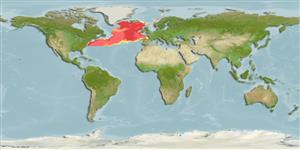Elasmobranchii (tubarões e raias) (sharks and rays) >
Carcharhiniformes (Ground sharks) >
Pentanchidae (Deepwater catsharks)
Etymology: Apristurus: a-, Latin privative, i.e., without; pristis, from pristes (Gr.), sawyer (but here meaning saw); oura (Gr.), tail, referring to absence of saw-toothed crest of enlarged dermal denticles along upper edge of caudal fin as found in the closely related Pristiurus (=Galeus). (See ETYFish); melanoasper: melanos (Gr.), black; asper (L.), rough, referring to black body color and rough skin. (See ETYFish).
Environment: milieu / climate zone / depth range / distribution range
Ecologia
marinhas batipelágico; intervalo de profundidade 512 - 1520 m (Ref. 56212). Deep-water
North Atlantic: Slope, off northern U.S. and off France, Ireland and British Isles.
Comprimento de primeira maturação / Tamanho / Peso / Idade
Maturity: Lm 57.0, range 55 - 59 cm
Max length : 76.1 cm TL macho/indeterminado; (Ref. 56212); 73.2 cm TL (female); peso máx. publicado: 1.3 kg (Ref. 56212); peso máx. publicado: 1.3 kg
Descrição suscinta
Morfologia | Morfometria
Diagnosis: Body uniformly black, slightly brownish in larger specimens. Dermal denticles large and giving a rough texture to the skin. Upper labial furrows longer than the lower ones. First dorsal fin only slightly smaller than the second dorsal fin, originating from above anterior third to middle of the pelvic fin base. Second dorsal fin insertion just before level of anal fin insertion. Interorbital space 1.9-3.5 times eye horizontal diameter. Abdomen between pectoral fin tip and pelvic fin origin 1.3-2.5 times pectoral fin width. Spiral valves of the intestine 19-23 (mostly 21-22). Monospondylous + precaudal diplospondylous vertebrae 36-43 + 26-32 (often 38-40 + 28-30). Dermal denticles on tongue and palate absent (Ref. 56212).
Found generally at depths of more than 1000 meters (Ref. 56212).
Ciclo de vida ou comportamento de acasalamento
Maturidade | Reprodução | Desova | Ovos | Fecundidade | Larvas
Iglésias, S.P., K. Nakaya and M. Stehmann, 2004. Apristurus melanoasper, a new species of deep-water catshark from the North Atlantic (Chondrichthyes: Carcharhiniformes: Scyliorhinidae). Cybium 28(4):345-356. (Ref. 56212)
Status na Lista Vermelha da UICN (Ref. 130435)
Ameaça para os humanos
Harmless
Uso pelos humanos
Mais informação
Idade/TamanhoCrescimentoPeso-comprimentoComprimento-comprimentoFrequências de comprimentoMorfometriaMorfologiaLarvasDinâmica larvalRecrutamentoAbundânciaBRUVS
ReferênciasAquaculturaPerfil para aquaculturaEstirpesGenéticaElectrophoresesHereditariedadeDoençasProcessamentoNutrientsConversão de massa
ColaboradoresFotosStamps, Coins Misc.SonsCiguateraVelocidadeTipo de nataçãoÁrea branquialOtólitosCérebrosVisão
Ferramentas
Relatórios especiais
Baixar XML
Fontes da internet
Estimates based on models
Preferred temperature (Ref.
123201): 3.5 - 9.9, mean 7.2 °C (based on 79 cells).
Índice de diversidade filogenética (Ref.
82804): PD
50 = 0.5000 [Uniqueness, from 0.5 = low to 2.0 = high].
Bayesian length-weight: a=0.00355 (0.00176 - 0.00714), b=3.09 (2.91 - 3.27), in cm total length, based on LWR estimates for this (Sub)family-body shape (Ref.
93245).
Nível Trófico (Ref.
69278): 4.0 ±0.4 se; based on size and trophs of closest relatives
Resiliência (Ref.
120179): Muito baixo(a), tempo mínimo de duplicação da população maior que 14 anos (Fec assumed to be <10).
Fishing Vulnerability (Ref.
59153): Moderate to high vulnerability (50 of 100).
Nutrients (Ref.
124155): Calcium = 8.66 [1.82, 62.13] mg/100g; Iron = 0.255 [0.057, 1.009] mg/100g; Protein = 19.6 [17.3, 21.9] %; Omega3 = 0.115 [0.035, 0.351] g/100g; Selenium = 13.7 [3.4, 53.5] μg/100g; VitaminA = 13.5 [1.6, 98.3] μg/100g; Zinc = 0.388 [0.159, 0.952] mg/100g (wet weight);
